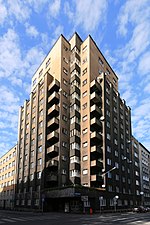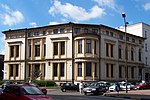Brynów-Osiedle Zgrzebnioka (full name: Brynów część wschodnia-Osiedle Zgrzebnioka) is a district of Katowice, located in the central part of the city, within the western district cluster. It borders four other districts: Śródmieście, Osiedle Paderewskiego – Muchowiec, Piotrowice-Ochojec, and Załęska Hałda-Brynów. This district primarily encompasses the eastern part of the historical Brynów municipality, along with the estates established within it, such as Brynów A, Ptasie, and Zgrzebnioka, as well as new housing complexes developed in the area around Ceglana and Meteorologów streets.
The first mention of Brynów dates back to 1474, and until the 19th century, it was an agricultural settlement. In 1801, the Beate coal mine was established, and in 1823, the Henriette zinc smelter was founded. With the opening of the Oheim coal mine (later known as Wujek) in 1899, the northern part of the present district, Katowicka Hałda, began to develop rapidly. In 1888, on the grounds of the former Beate mine, a new park complex was being created in a suburban forest, and between 1894 and 1895, Süd Park was established, later renamed Kościuszko Park in 1925. In 1912, the first tram arrived in the area from downtown Katowice, and in 1938, the wooden Church of St. Michael the Archangel was moved to Kościuszko Park. During the Polish People's Republic, new residential estates were built, such as Brynów A, Brynów B (Ptasie Estate), and Zgrzebniok Estate. On 5 February 1990, an ophthalmological hospital was opened in the district, and after 1989, the area around Ceglana Street became a hub for new housing investments.
Brynów-Osiedle Zgrzebnioka is a district with a dominant residential and recreational function, along with developed healthcare and administrative-office functions. It is home to one of the two facilities of the Professor Kornel Gibiński University Clinical Center in Katowice. A key cultural point in the district is Park Hall, where various concerts and events are organized, as well as Kościuszko Park, which, aside from its recreational role, serves as a venue for cultural events.
The northern boundary of the district is defined by the A4 autostrada, which is part of the European route E40, and key internal roads in the district include Mikołowska, Brynowska, and Tadeusz Kościuszko streets – the latter also hosts a tram line that connects the district with the city center. The area of the district is 4.08 km², which constitutes 2.48% of the city's total area, and at the end of 2020, it was home to 6,384 people (2.34% of Katowice's population).












